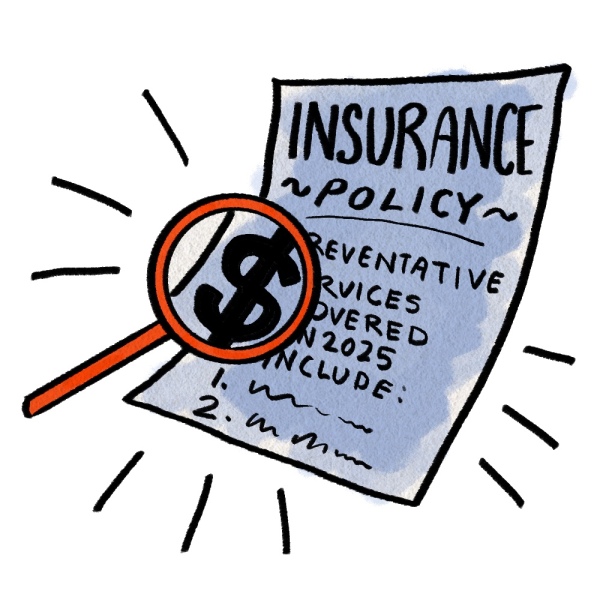
"My son was diagnosed with congenital CMV, a virus that can cause hearing loss. As part of this diagnosis, he will be required to have routine hearing tests every few months until he is 10 years old. I reached out to you because I wanted to know why my son's hearing tests weren't covered by our insurance and why we needed to pay for it."
— Anna Deutscher, 29, from Minnesota, writing about her infant son, Beckham
Trying to figure out why her claim was denied took Anna Deutscher a lot of time and work.
Baby Beckham's hearing screenings were preventive care, which is supposed to be covered by law. Every hearing test cost them about $350 out of pocket. Between those bills and Beckham's other health costs, the family maxed out two credit cards.
"Everything just immediately goes right to trying to pay that debt off," Deutscher said.
At times, she felt overwhelmed by her son's medical needs, on top of working. Deutscher said she "didn't know what else to do" when her insurance company kept saying no to her requests that it pay for the hearing tests.
No one wants to spend time fighting their health insurance company. Many people feel they don't have the knowledge or stamina to do it. But if, like Deutscher, you're denied for a preventive service, it may be worth it.
Health Care Helpline helps you navigate health care system hurdles. Send us your tricky question and we may tap a policy sleuth to puzzle it out. Share your story.
Here are a few tips — a slingshot and a few stones, so you can be David when facing a health care Goliath.
1. Check your policy
Read your plan documents to confirm whether the treatment or service is covered. Pay attention to any exclusions or limitations. Deutscher's plan documents say hearing tests are not covered. But even when a sought-after benefit is excluded, that might not be the end of the line.

2. Is the service preventive?
Many types of preventive care are supposed to be covered without additional cost under the Affordable Care Act. If you receive a recommended preventive screening and have private insurance, including through the Affordable Care Act marketplace, there should be no copayment at the time of service and you shouldn't get a bill later. A small number of insurance plans are "grandfathered" in, which means you may not have the same rights and protections as the ACA provides. Check with your employer's human resources benefits manager to find out for sure.
Here's a list of preventive services health plans must cover and the list specific to children and young adults.
A physician recommended regular hearing screenings for the Deutschers' baby, which the healthcare.gov list indicates should be considered preventive and covered by insurance. But JoAnn Volk, an insurance expert and a research professor at Georgetown University, said real life often doesn't match what the law requires.
"It really does come down to everyone sort of being on their best behavior on the provider and plan side to truly interpret and follow what should be covered," Volk said.
3. Peel apart the denial

If you've been denied coverage, you need to know why. Health insurance companies are required to explain every denial. The denial letter or your explanation of benefits should state the reason, which may be a coverage exclusion, incorrect coding, or a determination that the service was deemed not medically necessary. Follow up and ask for specific details about the denial and the criteria used, and request an explanation of benefits. Then use that information to build an appeal, being sure to address the reason for the denial.
4. File an appeal
There are a few steps to know, but you don't have to be a lawyer to figure them out. Usually there's an appeal form to fill out. Visit your insurer's website, check your explanation of benefits, or call your insurer and ask how to get started.
The process typically includes writing a letter saying why you disagree with the denial. Include any medical records or test results that support your case and a copy of the federal guidelines that show the care is a covered, preventive service. If you can, ask your physician to write a letter explaining why the service is preventive and necessary.
Your insurance company has 30 to 60 days to respond, depending on your state and health plan. If your appeal is denied, try again. Some people win on the second go-round.
If your appeal is denied a second time, you can request an external medical review. That process is led by a medical professional who is supposed to make an unbiased decision. In California, for instance, many health plans fall under the jurisdiction of the Department of Managed Health Care.
"In 2023, 72% of health plan members that came to us and filed an independent medical review ended up getting the service that they requested," said Mary Watanabe, who leads the department.
Keep deadlines in mind. How much time you have to file should be on your explanation of benefits. Your insurer is required by law to accept the external reviewer's decision.
For more help starting an appeal or asking for an external review, visit healthcare.gov or your state insurance department.
5. Ask human resources for help

If you get coverage through your job and you're hitting roadblocks, consider emailing your human resources department. HR folks have contacts with the insurance companies that you don't and may save you a few calls to the 800 number on the back of your insurance card. Legally, HR is under no obligation to help, and covering a health service may not be in your employer's financial interest. But sending HR the documents you prepared for the insurance appeal may prompt them to push the insurance company to take another look.
"The whole point of employers offering benefits is to attract and retain a solid workforce, right?" Volk said.
Making a case to HR may be a ramp toward getting the treatment or service covered the next time your company revises its health plan offerings, said Rhonda Buckholtz. She's a consultant who advises businesses on medical billing.
She said consumers can do a quick online search to see whether other large insurance companies in their area cover the health care service they need. That information can give you leverage, Buckholtz said.
Going to HR helped Deutscher. Eventually her employer said it would cover the cost of hearing tests for baby Beckham for the current plan year. Deutscher's employer has a self-funded plan, which gives companies the ability to customize benefits. It ultimately decided to add hearing tests as a standard benefit for all employees.
"It's been like this constant cloud hanging over my head, so for that to suddenly be lifted, it didn't feel real. I also have never gone to my HR for something like this before. I didn't even know this was an option," Deutscher said.
KFF Health News is a national newsroom that produces in-depth journalism about health issues and is one of the core operating programs at KFF.
Copyright 2025, KFF Health News




